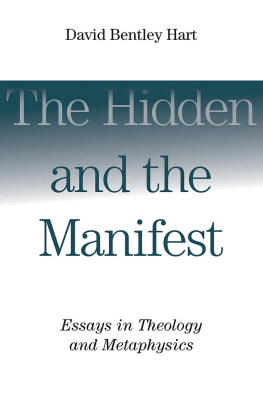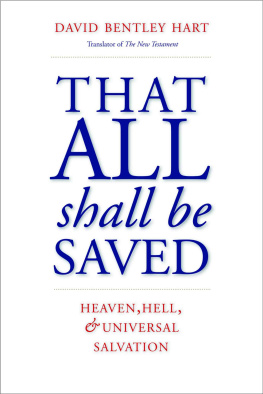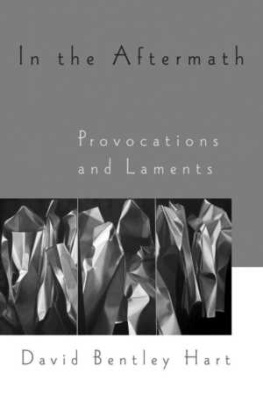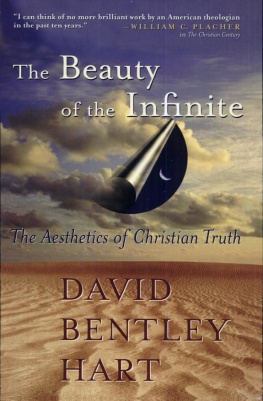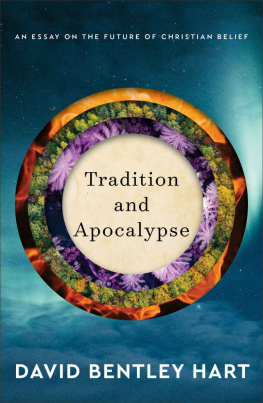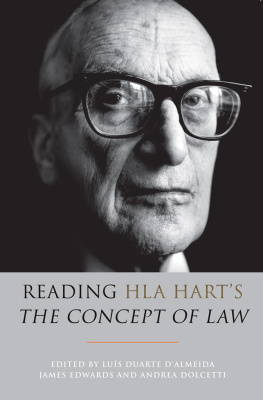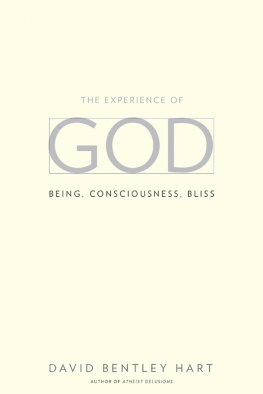The Hidden and the Manifest
Essays in Theology and Metaphysics
David Bentley Hart
WILLIAM B. EERDMANS PUBLISHINGCOMPANY
GRAND RAPIDS, MICHIGAN
Wm. B. Eerdmans Publishing Co.
2140 Oak Industrial Drive N.E., Grand Rapids, Michigan 49505
www.eerdmans.com
2017 David Bentley Hart
All rights reserved
Published 2017
Printed in the United States of America
23 22 21 20 19 18 171 2 3 4 5 6 7
ISBN 978-0-8028-6596-0
eISBN 978-1-4674-4696-9
Library of Congress Cataloging-in-Publication Data
Names: Hart, David Bentley, author.
Title: The hidden and the manifest : essays in theology and metaphysics / David Bentley Hart.
Description: Grand Rapids : Eerdmans Publishing Co., 2017. | Includes bibliographical references and index.
Identifiers: LCCN 2016053091 | ISBN 9780802865960 (pbk. : alk. paper)
Subjects: LCSH: Philosophical theology. | Theology. | Metaphysics.
Classification: LCC BT40 .H343 2017 | DDC 230dc23
LC record available at https://lccn.loc.gov/2016053091
Contents
This collection spans the better part of my scholarly career, as well as the better part of my theological interests. Even those pieces that concern topics at something of a tangent from the broad main courses of my work touch, for the most part, on themes quite near my heart. Two are the texts of public addresses produced for very specific occasions and have not been published before; one, a somewhat eccentric essay on the topic of thrift, was intended for print in a volume arising from one of the more peculiar projects I have participated in, but proved somewhat thematically incongruous with the rest of the book and was withdrawn (the book was intended as a hymn of celebration to thrift as a virtue, I believe, but my remarks struck a number of discordant notes); the rest have all been printed previously, and their provenances are named in the footnotes. All pieces are reprinted with permission. And I should record my thanks to my research assistant at St. Louis University, Jacob Prahlow, for his diligence in obtaining those permissions and in assembling this volume from so many disparate manuscripts.
I have altered very little, for better or worse, but I have attempted to remove from those articles that appeared in larger collections most cross-references to the articles of other contributors in the same volumes, lest I produce a one-sided impression of the discussions from which the pieces arose (and unfairly give myself the last word). I have also decided not to attempt to soften some of the more immoderate or provocative remarks in these essays, despite my new resolve to strike a more emollient tone whenever I can, because it would be wrong to change the record now, and would in any event probably be quite insincere. I ask readers only to believe that everything intemperate herein is offered in a spirit of good humor, without malice and in full expectation of reciprocal treatment in kind, and any lack of proper restraint on my part below is not really my fault, but that of the teacher of my literary infancy, H. L. Mencken (to whom any complaints should be addressed). I should mention that, in some cases, various of these essays cover some of the same ground in the same language (indeed, verbatim). In fact, the seventh essay collected here was written as a kind of distillation and reconsideration of various aspects of the essays that precede it in these pages. I might have changed the texts to avoid redundancy, and so spared the reader the tedium of grimacing more than once at the same obnoxious formulations, but each essay has its own integrity, and there is a point in time past which one cannot go back and change what one has written without doing more harm than good. So I hope readers will pardon the pleonasms.
I should also note that I have made no attempt here to bring earlier pieces into conformity with my later prejudices and predispositions. I suppose there have been fewer changes in that regard than I sometimes imagineat least, in reviewing some of these pieces, I have found that I had already said things in them that I had not remembered already thinkingand in general I expect the only true difference of significance is one of candor. I am much more comfortable now than I once was with an open avowal of a kind of Christian Platonism (with a few Aristotelian inflections) as the imprecise but satisfactory description of my metaphysical predilections. In the past, and then only very occasionally, I thought I had to pay pious lip service to the anxieties and apprehensions of those less at ease with that designation than I was and am (much as I used to feel I was obliged to be guarded and hesitant in confessing my universalism, so as not pater le bedeau). Now I realize that this was not necessary, that Christian Platonism is not a metaphysics that dare not speak its name, and that I can trust in the intelligence, good will, and prudence of my readers. In fact, I really cannot imagine an alternative metaphysics for theology that does not ultimately collapse under the weight of its own contradictions; and I certainly have no patience for the dangerous fantasy that theology could or should be done without metaphysics. Then again, I do not really believe that much of anything can be done without metaphysics, either explicit or implicit, and so the truly liberating future course for theology in that regard (and for every field of humane reflection) should be to seek a way to get beyond getting beyond metaphysics.
Every blessing. Orate pro me, Fratres et Sorores.
For
Alex Giltner and Stephen Lawson
friends lately found,
and in a dark season
The Offering of Names: Metaphysics, Nihilism, and Analogy
Reprinted by permission of T. & T. Clark from The Offering of Names: Metaphysics, Nihilism, and Analogy, in Reason and the Reasons of Faith, ed. Reinhard Htter and Paul J. Griffiths (Edinburgh: T. & T. Clark, 2005), pp. 5576. Copyright 2005. All Rights Reserved.
No Shadow of Turning: On Divine Impassibility
2002 Pro Ecclesia. Originally published in Pro Ecclesia 11, no. 2 (Spring 2002): 184206. Reprinted with permission.
The Writing of the Kingdom: Thirty-Three Aphorisms toward an Eschatology of the Text
2000 Modern Theology. Originally published in Modern Theology 16, no. 2 (Spring 2000): 181202. Reprinted with permission.
From Notes on the Concept of the Infinite in the History of Western Metaphysics: Part I
Reprinted by permission of Cambridge University Press from Notes on the Concept of the Infinite in the History of Western Metaphysics, in Infinity: New Research Frontiers, ed. Michael Heller and W. Hugh Woodin (Cambridge: Cambridge University Press, 2011), pp. 25574. Copyright 2011. All Rights Reserved.
The Destiny of Christian Metaphysics: Reflections on the Analogia Entis
Reprinted by permission of the William B. Eerdmans Publishing Company from The Destiny of Christian Metaphysics: Reflections on the Analogia Entis, in Analogia Entis: Invention of Antichrist or Wisdom of God? ed. Thomas Joseph White, OP (Grand Rapids: Eerdmans, 2010), pp. 395410. Copyright 2010. All Rights Reserved.
The Mirror of the Infinite: Gregory of Nyssa and the Vestigia Trinitatis
2002 Modern Theology. Originally published in Modern Theology 18, no. 4 (Fall 2002): 54161. Reprinted with permission.
The Hidden and the Manifest: Metaphysics after Nicaea
Reprinted by permission of the publishers from The Hidden and the Manifest: Metaphysics after Nicaea, in

